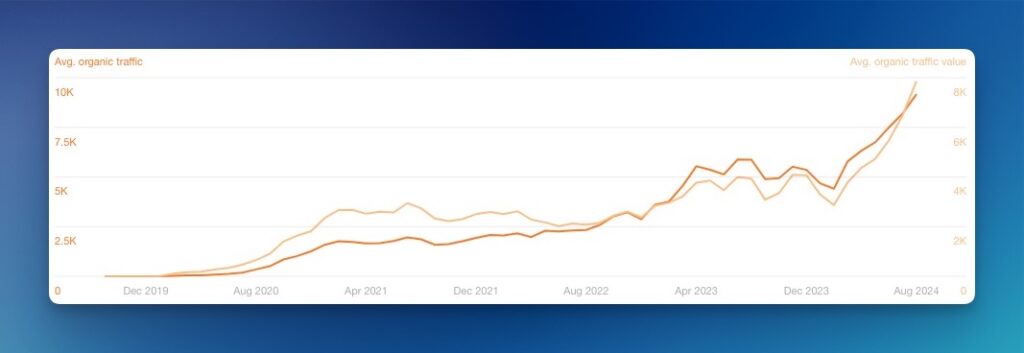As an SEO consultant who’s been in the trenches for well over a decade, I’m convinced that organic search is among the most important lead acquisition channels for B2B companies. I know this to be true, because my clients consistently tell me that this is the case.
Unlike B2C markets, where easy-in, easy-out purchases dominate, most B2B companies thrive on building long-term relationships with buyers and decision-makers. These people don’t buy from brands they’ve never heard of, they want to buy from businesses that they find to be an authority.
I’m sure you’ll agree that being visible at the top of search result pages when a prospect is looking for your products or services is a great way to build trust.
The “wild west” days of SEO are over, and the top positions are taken by brands that have spent the time, and budget, to build this trust. Short of in-person referrals, this is probably the best lead-gen move you can make.
It’s not only my clients who have put this channel to good use. As someone who’s sold and delivered B2B services over the years, I know this strategy works, because it’s how I get most of my leads.
If you’re one of the many people who found this page while looking for a B2B SEO consultant in Google, you’ve experienced this from the buyer’s side.

I’ve helped this long-term client to become a market leader and true authority in their niche. Organic search has been their #1 source of new business for many years now and I help them to continue this growth today.
Highly communicative, very clear yet concise, while being extremely responsive to questions and problems. Most importantly, he gets results. I trust Jase completely and recommend him to any other B2B businesses looking to grow their organic search traffic.
Harry Morton, Founder, Lower Street
Publishing content that appeals to everyone involved in the purchase process is instrumental to this strategy, but it’s more nuanced than that.
Yes, SEO best practices are at play, but considering the buyer’s journey and sales cycle of your products or services is key for B2B companies. Ignore this and you may end up wasting resources.
Though content is a key component, it’s not everything. With a strong background in digital PR and technical SEO, I’m equipped to help position your website in front of your customers on various search engines and drive more sales-ready leads.
If you’re eager to see measurable results, generate more revenue from search, close high value sales, and grow your business’s bottom line, connect with me today.
B2B SEO Matters
As great as it sounds, ranking on page 1 and keeping it that way isn’t easy. Especially when your competitors are constantly gunning for the same spot.
Consistency is the name of the game when it comes to cracking SEO. If you care about the consistent flow of traffic and inbound leads, you need to make it easier for search engines like Google or Bing to crawl, index, and rank your website for industry terms.
For that to happen, you need a technically sound SEO strategy, implemented by someone who has your best interests in mind, because it’s hard work. It’s rarely a one-and-done type deal.
Sure, there are easy ways to rank, but you and I are in the business of building assets, not hustling for cash.
Attaining short term success in this industry may appear to be the easy approach, but it almost always backfires, leading to lower search performance, or a complete loss of rankings, and removal from search results.
SEO done right involves doing the work, implementing and executing on a strategy that is tried and true. At the same time, we’re also not so stubborn as to stick to the strategy when it’s clearly past its expiry date. We need to identify patterns and adapt the strategy as circumstances arise.
That’s why it’s crucial to hire an expert who has seen it all. I’ve been lucky enough to work with publicly traded companies, founder owned businesses, SaaS companies, and just about everything in between.
Board Ready Strategies for B2B Success

B2C and B2B SEO solutions share many commonalities, but they differ in goals and execution. That’s in part because of the kind of purchasing processes involved in both.
The two aren’t mutually exclusive though—many companies sell to businesses and consumers. It’s also worth noting that ultimately, businesses are made up of people, so B2B SEO still involves optimising your website for people.
Even though the core principles of SEO remain, they need to be adapted to the unique challenges involved in B2B sales cycles, ranging from the number of people involved, product complexity, ticket size, increased scrutiny, and so on.
Audience Targeting and Buyer Intent
Unlike selling to consumers, selling to businesses requires you to persuade not just one person, but everyone associated with the purchase decision, which usually involves half a dozen people.
The end users of your product or service aren’t necessarily going to be the ones buying it. Let’s say your product is meant for content writers or sales associates. They’re unlikely to be the ones making the payment.
To get the deal through, it’s important that your website speaks to all the stakeholders involved.
An experienced consultant that is building out a quality B2B SEO campaign will know this ahead of time, and take the time to study your customers in depth, allowing you to earn more targeted traffic from varying stakeholders at each stage of their buyer’s journey.
Keyword Research
Good keyword research is often the difference between getting a positive ROI or wasted resources.
Ranking at the top of search results for industry-specific terms is difficult, especially for specific, low-volume keywords that are often the norm in B2B SEO.
This doesn’t mean that we should be ignoring these opportunities. “The riches are in the niches” is true of these sorts of SEO campaigns. Taking the time to work out when you should go after them is money well spent.
Content Strategy
When it comes to optimising your website’s visibility for other businesses, your messaging needs to be designed for executives, managers, and decision makers.
Unlike B2C content, which tends to be more bite sized and shareable for a wider appeal, B2B content often needs to be more technical, educational, and informative. It’s meant to build trust and demonstrate thought leadership in your industry.
This may include whitepapers, case studies, industry reports, and long-form blog posts that address specific challenges or solutions. It also involves staying “on brand”. There’s no point in ranking #1 and gaining a lot of traffic if the content that these people continue to read reduces trust.
A single piece of content can keep bringing you more and more leads each month if it is optimised well. The latter involves following Google’s quality guidelines, assuming that’s the search engine you wish to rank in.
Conversion Path
B2B sales tend to involve more people and higher ticket sizes, which not only invites more scrutiny but also prolongs the sales cycle. It can take months or even years to close a deal, so staying front of mind is vital.
Different departments may be involved in the purchase, especially if the product in question enables collaboration or integration with other products. Depending on what you’re selling, you may also need to work with compliance, procurement, and legal departments.
Your SEO efforts need to reflect this, by being aligned with each stage of the sales funnel, from awareness to consideration to decision.
Link Building and Brand Authority
B2B link building involves securing backlinks from authoritative industry websites, trade publications, and niche blogs. The better the quality of these links, the higher your chances of ranking in result pages.
Having worked with more than my fair share of websites, I’ve learned that some links are truly valuable, while others should be avoided, in a means to protect your website’s rankings.
Of course, high-quality links that pass authority signals aren’t easy to get. Even if you land them editorially using digital PR platforms such as Connectively (formerly HARO), it still involves a lot of labour, and remember, your time is money.
It’s expensive one way or another, but without any decent links, search engines may not even know your site exists.
Links are the single biggest indicator of trust. They’ve been a core element of SEO since the concept of PageRank was introduced by Google’s co-founders in 1996.
Investing in links and building a solid brand is key to ranking your B2B website well in Google. Don’t look past it.
FAQs
As you seek to find a B2B SEO consultant you can trust, it’s natural to have questions about the strategies and tactics involved.
To help you get a clearer picture, I’ve compiled answers to some of the most common questions I encounter from clients.
Is B2B SEO a Long Term Strategy?
Yes. SEO, in general, is a long-term strategy, as it involves building authority, trust, and visibility over time.
Unlike short-term tactics like paid advertising, SEO focuses on sustainable growth by improving your website’s organic rankings and establishing your brand as a leader in your industry. This website then becomes an asset that will work while you sleep, and increase the value of your business.
Results will take time, but the long-term benefits are worthwhile. These include:
- steady stream of high-quality leads,
- improved brand credibility, and
- a competitive edge in your market.
How Do I Track Success?
Tracking success in B2B SEO involves monitoring KPIs, such as:
- organic traffic growth,
- click-through rate,
- pageviews,
- traffic value,
- referring domains, and
- core web vitals.
Tools like Google Analytics and Ahrefs can help you track these metrics and evaluate the effectiveness of your SEO strategy. Doing this regularly ensures your campaign is on track and aligned with your business goals.
Additionally, measuring the quality of leads, engagement rates on content, and the impact of SEO on the sales pipeline are crucial for assessing ROI. This is something I’ll help you with.
How Do B2B and B2C SEO Strategies Differ?
B2B SEO focuses on targeting decision-makers within companies, which often involves a more complex sales cycle and high-value transactions.
Even if your product is more transactional in nature, like an affordable SaaS or low-priced service, the content is usually more technical, informative, and tailored to address specific industry challenges, as opposed to the more general and emotional appeal used in B2C businesses.
Jase is an expert who delivers results with high integrity. What you’ll get from him is succinct and focused. There’s no fluff here, it’s advice to rely on.
We’ve had measurable results in terms of rankings and inbound leads, sure, but the real metric we care about is leads which generate sales and profits. We have 5x’d our investment.
Marc Gadsdon, Director, Logicata
Maximise Your Reach Where It Matters

Business to business relationships aren’t as fleeting as what you usually see in direct to consumer sales.
Brand loyalty is definitely a factor, but it’s far easier for consumers to simply buy from someone else than it is for established businesses to switch vendors.
The latter may involve disruption of ongoing operations, migrating data, or updating internal systems, all of which can lead to downtime and reduced efficiency during the transition.
That’s why B2B relationships are typically built on long-term partnerships, where trust is arguably the most important factor.
If your website doesn’t hit the mark during the vetting stage, even if you have what it takes to deliver and outperform your competitors, you may just get overlooked. Your prospects have other options.
Even though SERPs only display 10 results at a time, you need to stand out and dominate. That’s what I’m here for.
When you work with me, you’ll get a B2B SEO specialist who also happens to be a technical SEO consultant who will leave no stone unturned in pursuing results. As boring as it may sound, I live and breathe this stuff.
Whether you’re looking to drive more leads, improve your search engine rankings, or target cross-border markets through international SEO, I’m here to help. Connect with me for a discovery call where we’ll discuss your goals and see if we’re a good fit.